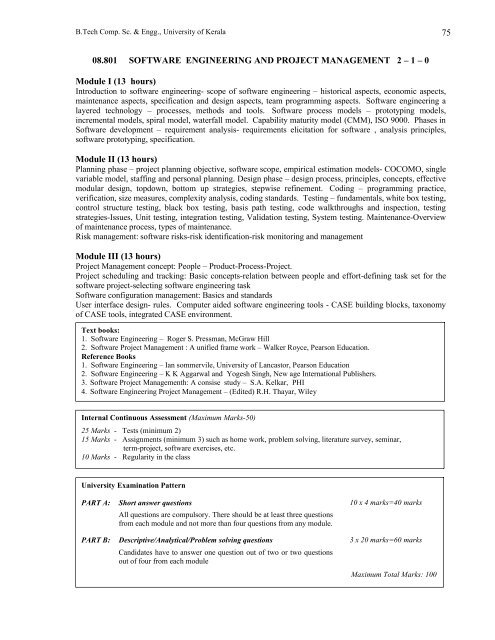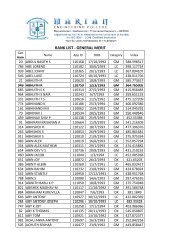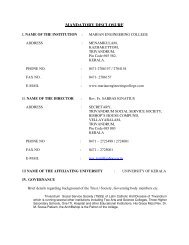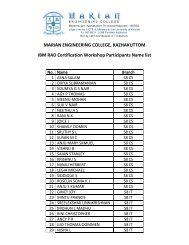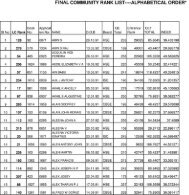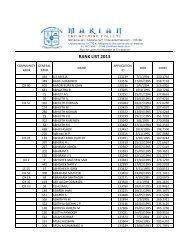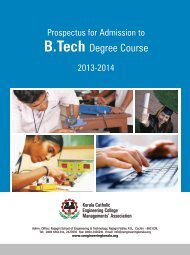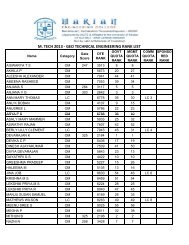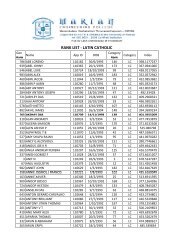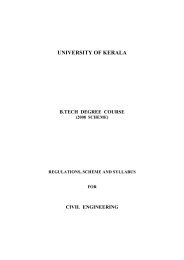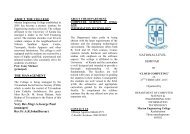UNIVERSITY OF KERALA - Marian Engineering College
UNIVERSITY OF KERALA - Marian Engineering College
UNIVERSITY OF KERALA - Marian Engineering College
Create successful ePaper yourself
Turn your PDF publications into a flip-book with our unique Google optimized e-Paper software.
B.Tech Comp. Sc. & Engg., University of Kerala 75<br />
08.801 S<strong>OF</strong>TWARE ENGINEERING AND PROJECT MANAGEMENT 2 – 1 – 0<br />
Module I (13 hours)<br />
Introduction to software engineering- scope of software engineering – historical aspects, economic aspects,<br />
maintenance aspects, specification and design aspects, team programming aspects. Software engineering a<br />
layered technology – processes, methods and tools. Software process models – prototyping models,<br />
incremental models, spiral model, waterfall model. Capability maturity model (CMM), ISO 9000. Phases in<br />
Software development – requirement analysis- requirements elicitation for software , analysis principles,<br />
software prototyping, specification.<br />
Module II (13 hours)<br />
Planning phase – project planning objective, software scope, empirical estimation models- COCOMO, single<br />
variable model, staffing and personal planning. Design phase – design process, principles, concepts, effective<br />
modular design, topdown, bottom up strategies, stepwise refinement. Coding – programming practice,<br />
verification, size measures, complexity analysis, coding standards. Testing – fundamentals, white box testing,<br />
control structure testing, black box testing, basis path testing, code walkthroughs and inspection, testing<br />
strategies-Issues, Unit testing, integration testing, Validation testing, System testing. Maintenance-Overview<br />
of maintenance process, types of maintenance.<br />
Risk management: software risks-risk identification-risk monitoring and management<br />
Module III (13 hours)<br />
Project Management concept: People – Product-Process-Project.<br />
Project scheduling and tracking: Basic concepts-relation between people and effort-defining task set for the<br />
software project-selecting software engineering task<br />
Software configuration management: Basics and standards<br />
User interface design- rules. Computer aided software engineering tools - CASE building blocks, taxonomy<br />
of CASE tools, integrated CASE environment.<br />
Text books:<br />
1. Software <strong>Engineering</strong> – Roger S. Pressman, McGraw Hill<br />
2. Software Project Management : A unified frame work – Walker Royce, Pearson Education.<br />
Reference Books<br />
1. Software <strong>Engineering</strong> – Ian sommervile, University of Lancastor, Pearson Education<br />
2. Software <strong>Engineering</strong> – K K Aggarwal and Yogesh Singh, New age International Publishers.<br />
3. Software Project Managementh: A consise study – S.A. Kelkar, PHI<br />
4. Software <strong>Engineering</strong> Project Management – (Edited) R.H. Thayar, Wiley<br />
Internal Continuous Assessment (Maximum Marks-50)<br />
25 Marks - Tests (minimum 2)<br />
15 Marks - Assignments (minimum 3) such as home work, problem solving, literature survey, seminar,<br />
term-project, software exercises, etc.<br />
10 Marks - Regularity in the class<br />
University Examination Pattern<br />
PART A: Short answer questions 10 x 4 marks=40 marks<br />
All questions are compulsory. There should be at least three questions<br />
from each module and not more than four questions from any module.<br />
PART B: Descriptive/Analytical/Problem solving questions 3 x 20 marks=60 marks<br />
Candidates have to answer one question out of two or two questions<br />
out of four from each module<br />
Maximum Total Marks: 100


